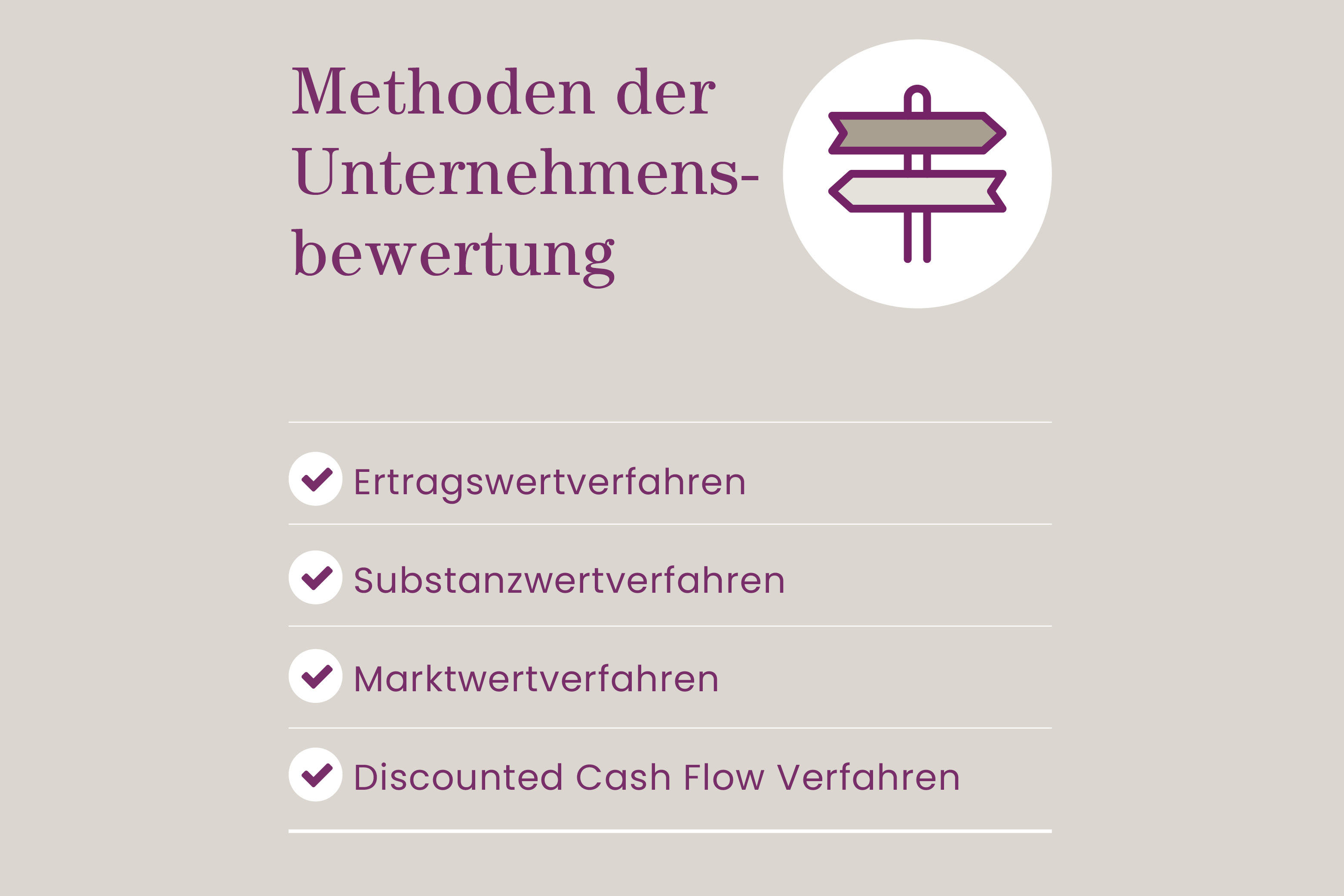Methods, process and significance

Company valuation
The valuation of a company is more than just a collection of assets, employees and products. It is the result of a detailed analysis that reveals the true value of your life’s work. Whether entrepreneur, investor or potential buyer – the company valuation provides essential information for each party.
For entrepreneurs, it is the foundation for strategic decisions such as succession planning, sale or merger. Investors use it to assess the potential of a company and make well-founded investment decisions. Buyers, on the other hand, can use an objective valuation to develop realistic price expectations and minimise risks.
There are different methods for valuing a company – from analysing the net asset value to forecasting future earnings power and comparing it with similar companies on the market. At LW·P Lüders Warneboldt, we are experts in all common valuation methods and will work with you to find the optimum approach for your individual situation.
This article gives you a comprehensive overview of the valuation of a company. You will learn which methods are available, how the valuation process works and the importance of a well-founded valuation for the success of your company.
What is a company valuation?
A company valuation is the systematic determination of the economic value of a company. It provides a well-founded statement about what a company is worth at the time of the valuation. The company value is not simply the sum of the assets, but a complex construct that takes various factors into account.
Purpose of a company valuation:
- Transparent basis for decision-making: an objective valuation creates clarity and enables well-founded decisions to be made in different company situations.
- Strong negotiating position: Whether you are selling, buying or discussing financing – a well-founded valuation strengthens your position at the negotiating table.
- Securing future viability: A realistic assessment of the company value is essential for successful succession planning.
- Clarity in inheritance and family law disputes : in family and inheritance law disputes, company valuations are necessary to achieve balanced solutions.
Methods for calculating the company value:
There are various approaches to business valuation, each of which takes different aspects into account:
- Income capitalisation approach: These methods focus on the future earning power of a company. A well-known example is the discounted cash flow method (DCF), in which future cash flows are discounted to the current value.
- Net asset value method: Here, the focus is on the value of the tangible assets. The net asset value results from the value of the assets minus the liabilities.
- Discounted cash flow method (DCF): This method discounts future cash flows to their present value. It is considered one of the most precise valuation methods, but requires detailed forecasts.
- Multiplier method: In this approach, key figures of the company to be valued are set in relation to those of comparable companies.
- Venture capital method: This method is used in particular for start-ups and young companies, where traditional valuation approaches often reach their limits.
In addition to these classic methods, there are other methods that can be used depending on the sector and size of the company.
At LW·P Lüders Warneboldt, we analyse your individual situation and work with you to select the right method for determining the value of your company. Contact us for a free initial consultation.

Why is a company valuation important?
The following reasons illustrate their importance:
- Company sale: In the event of a planned sale, the valuation enables realistic pricing. It strengthens the seller’s negotiating position and creates confidence in the potential buyer.
- Succession and handover: In the context of company succession, the valuation helps to determine a fair handover value. This is particularly important if the company is passed on within the family.
- Strategic reorganisation: A valuation can provide information about strengths and weaknesses and thus form the basis for forward-looking decisions.
- Company acquisition: A valuation is essential for buyers to assess the potential and risks of a target company.
The relevance and benefits of a company valuation extend to various stakeholders:
- Entrepreneurs receive a clear picture of the value of their life’s work and can make well-founded decisions.
- Investors and banks use the valuation as a basis for financing decisions.
- Employees benefit from the planning security offered by a transparent valuation.
- Customers and suppliers appreciate the stability that results from a sound corporate strategy.
The advantages of a precise company valuation:
- Objective basis for decision-making: It provides reliable facts beyond emotional attachments.
- Uncovering value drivers: The analysis shows which factors have a particular influence on the company value.
- Risk minimisation: Potential weaknesses are identified at an early stage and can be addressed.
- Optimisation of the company structure: The valuation can reveal starting points for increasing efficiency.
- Negotiation security: In sales or merger negotiations, it provides a solid basis for argumentation.
A company valuation is much more than just analysing figures. It is a strategic instrument that provides you with orientation in different phases of your company and enables you to make well-founded decisions.
How does the company valuation differ from the company price?
The company valuation and the final company price achieved are two closely related but different aspects. A clear understanding of these differences is important for entrepreneurs, buyers and sellers alike.
While the valuation determines the objective value of a company, the price reflects the actual amount paid in a transaction.
The difference in detail:
- Company valuation: Based on recognised methods and takes into account a variety of factors, such as earning power, net asset value and market comparison. It is a well-founded analysis that reflects the economic value of a company at the time of valuation.
- Company price: The price is the result of negotiations between buyer and seller and may differ from the objective valuation. It is influenced by numerous factors, such as negotiating skills, market situation, emotions and individual interests.


For entrepreneurs, their company is often more than just a capital investment. It is a life’s work into which a great deal of heart and soul and passion have been poured. However, this emotional value is not always the same as the real value of the company.
A professional company valuation helps you to separate the emotional value from the objective reality. It provides you with a basis for negotiations and decisions that are based on facts and not emotions.
What methods of company valuation are there?
Various valuation methods are used in company valuation. Each method has its own specific strengths and is particularly suitable for certain situations. We present the most important methods below:

The capitalised earnings method is based on the idea that the value of a company lies in its ability to generate future profits and cash flows. It takes into account both historical financial data and future expectations.
Focus on future profits and cash flows:
The capitalised earnings method forecasts the company’s future financial surpluses and discounts them to today’s value. Risks and opportunities that may affect future development are also taken into account.
Simplified capitalised earnings value method
The simplified capitalised earnings value method is a less complex variant of the capitalised earnings value method. It is based on a simplified calculation of future income and uses a flat capitalisation rate.
Example of company valuation using the capitalised earnings value method
A company expects an annual profit of 100,000 euros for the next five years. The capitalisation interest rate is 10%. In this simplified example, the capitalised earnings value of the company would be EUR 1,000,000 (EUR 100,000 / 0.1).
The net asset value method values a company on the basis of its tangible and intangible assets. These include, for example, property, machinery, patents and trademark rights.
Valuation of tangible and intangible assets:
In the net asset value method, the assets are valued individually and then added up to a total value. The company’s debts are deducted from this total value to determine the net asset value.
The market value method compares the company to be valued with similar companies that have recently been sold or are traded on the stock exchange.
Comparison with similar companies or transactions:
Comparative data is used to determine multiples that relate the company value to key figures such as sales or profit. These multiples are then applied to the company to be valued in order to determine the market value.
Multiplier method
The multiplier method is a common method within the market value method. It uses various multiples, such as the price-earnings ratio (P/E ratio) or the sales multiple, to determine the company value.
Venture capital method (VC method)
The venture capital method is often used to value start-ups and young companies. It is based on the assumption that the invested capital will be repaid after a certain period of time with a certain return.
The discounted cash flow method (DCF) is a widely used method for valuing companies. It is based on the idea that the value of a company is determined by the sum of its future discounted cash flows.
Sample calculation:
A company expects the following cash flows for the next five years:
- Year 1: 100,000 euros
- Year 2: 120,000 euros
- Year 3: 140,000 euros
- Year 4: 160,000 euros
- Year 5: 180,000 euros
The discount rate is 10%. In this example, the company value according to the DCF method would be EUR 513,168.
Each of these valuation methods has its specific advantages and disadvantages. In practice, a combination of different methods is often used in order to achieve a result that is as meaningful as possible. The choice of the appropriate method depends on factors such as company size, sector, life cycle phase and the reason for the valuation.
The most important steps in the evaluation process:
Clarification of the purpose of the valuation (e.g. sale, purchase, succession) and determination of the relevant valuation methods.
Collection and analysis of all relevant company data, such as annual financial statements, key financial figures, market reports, corporate planning and industry analyses.
Selection of the appropriate method (e.g. capitalised earnings value, net asset value or market value method), taking into account the individual situation of the company and, if necessary, the applicable standards for auditors (IDW S1)
Application of the selected methods for calculating the enterprise value.
Checking the plausibility and consistency of the results.
Documentation of the valuation results in a detailed report that transparently presents all relevant information and assumptions.
How is a company valuation carried out?
The valuation of companies is a structured process that comprises various steps in order to achieve a precise and meaningful result.

Valuers and experts play a central role in the valuation process. They have the necessary expertise and experience to accurately determine the value of a company. These experts are responsible for selecting the appropriate valuation methods and ensuring that all relevant factors are taken into account. Their independence and objectivity are crucial to ensure a reliable and unbiased valuation.
An experienced valuation expert provides not only a technical valuation but also strategic advice to understand the impact of the valuation on the future development of the business. They help to identify potential risks and opportunities and provide valuable insights.
Are you facing important business decisions? Would you like to know the true value of your company? Take advantage of our expertise and many years of experience in company valuation. Arrange a non-binding initial consultation with our experts now.

What are the most important factors that influence the value of a company?
The value of a company is influenced by several factors, which can be both quantitative and qualitative in nature.
The financial situation of a company is a decisive factor in its valuation. A high turnover and stable profits are positive indicators of a company’s value. At the same time, high debt can reduce the value as it restricts the company’s financial flexibility.
The positioning of a company in the market plays an important role in the valuation. A high market share and strong competitiveness are positive indicators of a company’s value. They show that the company is able to win and retain customers and that it can hold its own against competitors.
A sustainable business model is a key factor for the long-term success and therefore also for the value of a company. Companies that are characterised by sustainability and innovative strength are generally more attractive to investors and buyers.
Every company is confronted with risks that can have an impact on its enterprise value. These include market risks, such as economic fluctuations or changes in customer behaviour, as well as competition-specific risks, such as new competitors or disruptive technologies. Company-specific risks, such as dependence on key personnel or supply bottlenecks, must also be taken into account in the valuation.
The expertise of employees and the quality of management are decisive factors for the success of a company. An experienced and competent management team that is able to lead the company through difficult times increases the value of the company. Equally important is a high level of employee satisfaction, as motivated employees contribute to higher productivity and therefore to a higher company value.
These factors not only influence the value of the company, but also the price that can be realised on the market. A holistic view of all these aspects is crucial for a meaningful result.
Typical errors in company valuation
Various challenges can arise during implementation that lead to a distorted representation of the actual company value. In order to ensure a precise and meaningful valuation, it is important to recognise and avoid these typical pitfalls.
A common mistake in company valuation is overestimating future growth. Overly optimistic forecasts can artificially inflate the company value and lead to unrealistic expectations. A well-founded valuation is based on realistic assumptions that are underpinned by market analyses and industry comparisons.
Neglecting the market environment can also lead to incorrect valuations. New technologies, changing customer needs and other competitors can have a significant impact on the value of a company. A company valuation that does not take these factors into account does not provide a complete picture.
- Neglecting or underestimating risks poses major challenges for entrepreneurs:
- Overlooking industry-specific risks
- Underestimating regulatory changes
- Disregarding dependencies on key customers or suppliers
Careful risk analysis and assessment should be an integral part of every company valuation. The quantification of risks and their inclusion in the valuation models is crucial for a realistic valuation.
Company valuations are based on a variety of data, such as annual financial statements, financial ratios and market reports. Missing or inaccurate data can lead to incorrect results. Careful data collection and analysis is therefore essential.
Experienced experts provide the necessary expertise and an objective perspective, help to avoid pitfalls and ensure a realistic assessment of the company’s value.
Have your company evaluated by LW·P Lüders Warneboldt
Would you like to know the value of your company? Whether for strategic decisions, succession planning or transactions – a precise and objective company valuation is essential. LW·P Lüders Warneboldt is your experienced partner for a well-founded and transparent valuation.
Comprehensible, objective, neutral – your company value in the best hands:
As an independent third party, we determine the value of your company in a comprehensible and objective manner. Our experts are chartered accountants or Certified Valuation Analysts (CVA) and are familiar with national and international valuation standards. We prepare appraisals in accordance with the EACVA guidelines, both for business and legal issues.
Our expertise for your security:
- Company law: We prepare valuation reports for shareholder compensation or in the context of reorganisations.
- Inheritance and family law: We determine the company value for equalisation of gains, compulsory portion claims or inheritance disputes.
- Tax law: We prepare expert opinions for tax purposes, e.g. for gifts or inheritances.
- M&A transactions: We support you in determining the purchase price and due diligence.
- Arbitration reports: We prepare independent expert opinions for court or out-of-court disputes.
Your benefit: Individual advice and customised solutions
We understand that every company is unique. That’s why we offer you personalised advice tailored to your specific needs and objectives. Together we will develop a customised solution that gives you security and guidance.
Contact us now for a no-obligation consultation!
Conclusion: The value of a professional company valuation
A professional company valuation is far more than just a number. It is a strategic tool that provides you with clarity, security and room for manoeuvre. Whether you are planning your company succession, negotiating a purchase or sale or making strategic decisions – a sound valuation is your key to success.
A precise determination of the company value enables you to
- Make well-founded decisions: Make strategic decisions based on a solid foundation of information.
- Strong negotiating position: Negotiate confidently and achieve optimum results.
- Tax optimisation: Make optimum use of tax structuring options.
- Conflict avoidance: Create transparency and prevent misunderstandings.
LW·P Lüders Warneboldt is at your side as an experienced partner. We determine your company value precisely and objectively, based on recognised valuation methods and taking your individual situation into account.
FAQ - Frequently asked questions about business and company valuation
Company valuations are usually carried out by specialised experts such as auditors, tax consultants and management consultants. These experts have the necessary expertise and experience to determine the company value objectively and accurately. They are often also certified valuation experts (e.g. Certified Valuation Analyst, CVA) and adhere to national and international valuation standards.
The costs of a company valuation vary depending on the size and complexity of the company, the valuation methods used and the scope of the consultation. It is advisable to obtain various offers and compare the services in detail.
There are various methods of company valuation, each of which takes different aspects into account:
- Income capitalisation method (e.g. discounted cash flow method)
- Net asset value method
- Market value method (e.g. multiplier method)
The choice of the appropriate method depends on the individual objectives and the specific situation of the company.
Various key figures are relevant for the company valuation, such as
- Turnover
- Profit (EBIT, EBITDA)
- Cash flow
- Equity ratio
- Debt-equity ratio
- Market share
- Growth forecasts
These key figures provide information on the financial health and performance of the company and are therefore essential for a well-founded valuation.
Multiples are valuation ratios used in company valuations to determine the value of a company in comparison to similar companies. They are based on key financial figures such as EBITDA or turnover and are multiplied by a multiple derived from comparable transactions or market data. Multiples help to provide a quick overview of the value of a company in the market.
The discount rate plays a decisive role in company valuation, particularly in the discounted cash flow method (DCF). This interest rate reflects the risk and capital market expectations and is often referred to as the WACC (Weighted Average Cost of Capital). The WACC takes into account the costs of equity and debt capital and is used to discount future cash flows to their present value. A correct interest rate is crucial to ensure a realistic valuation.

